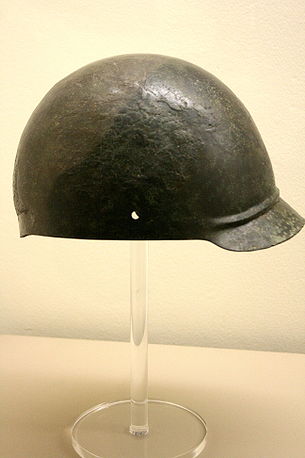| Development of the legionary helmet or galea | |
|---|---|

The Coolus helmet (named for Coolus, France) was a type of ancient Celtic and Roman helmet popular in the 1st century BCE. [1] [2] It was typically made in bronze or brass and, [3] like the Montefortino type with which it co-existed, was a descendant of Celtic helmet types. The explanation of the choice to use bronze can be attributed to the type of warfare that the helmet was used for; also the cultural affinities have influence on why the helmet was made the way that it was. [4] Within a long process of evolution, Roman military armor for the head developed from early pre-Roman helmets. Rome itself had no proper tradition of such objects, as most of the soldiers of the Early Republic made use of helmets produced by the Etruscans, whose craftsmen were known for their ability to make vessels. [5]
It was a fairly plain globular or hemispherical helmet with a brow guard, a ribbed neck guard, and large hinged cheek guards. The cheek guards and neck guards projected outwards across the jaw and the cheeks although they did not impair the vision of the wearer. [6] Another common feature was a turned or cast soldered- or riveted-on crest knob. [7] The cheek guards were manufactured separately from the helmet and riveted onto it. [7] The Coolus helmet has become a well known and recognizable part of historical warfare.
The Coolus was replaced by the Imperial helmet type, a more developed form also derived from a Celtic original. [8]
Examples
- Canterbury helmet
- Thames Coolus helmet. This helmet was dug out of the River Thames in England; the helmet has been in the British Museum since 1950. [9]
Sources
References
-
^
"Proceedings of the 1st and 2nd International Doctoral Student Conference on Archaeology (IDSCA)".
University of Zagreb. 2021: 64.
{{ cite journal}}: Cite journal requires|journal=( help) - ^ Adkins, Lesley; Adkins, Roy A. (1998). Handbook to Life in Ancient Rome. OUP USA. p. 84. ISBN 978-0-19-512332-6.
- ^ Narloch, Krzysztof (2012). "The cold face of battle – some remarks on the function of Roman helmets with face masks". Archäologisches Korrespondenzblatt. 42 (3): 379. doi: 10.11588/ak.2012.3.18622. ISSN 2364-4729.
- ^ Paddock, J. M. (1993). The bronze Italian helmet : the development of the Cassis from the last quarter of the sixth century B.C. to the third quarter of the first century A.D (Thesis).
- ^ Feugère, Michel (2015). "Helmet". The Encyclopedia of the Roman Army. pp. 455–491. doi: 10.1002/9781118318140.wbra0734. ISBN 978-1-118-31814-0.
- ^ Stephenson, Ian (2015-03-04), "Infantry: Principate", in Le Bohec, Yann (ed.), The Encyclopedia of the Roman Army, Chichester, UK: John Wiley & Sons, Ltd, pp. 492–556, doi: 10.1002/9781118318140.wbra0800, ISBN 978-1-118-31814-0, retrieved 2023-04-07
- ^ a b Olson, Brandon R. (2013-01-01). "Roman Infantry Helmets and Commemoration among Soldiers". Vulcan. 1 (1): 3–19. doi: 10.1163/22134603-00101001. ISSN 2213-4603.
- ^ Ermatinger, James W. (2015-08-11). The World of Ancient Rome: A Daily Life Encyclopedia: A Daily Life Encyclopedia. ABC-CLIO. p. 470. ISBN 978-1-4408-2908-6.
- ^ Kaminski, Jaime; Sim, David (1 January 2012). "The production and deposition of the Thames coolus helmet" (PDF). Transactions of the London and Middlesex Archaeological Society. 62: 69–87.